Rachel Held Evans's Blog, page 36
July 27, 2013
On millennials and the Church...
I wrote an article about
millennials and the Church for the CNN Belief Blog today. Hope its starts some
conversations!
At 32, I barely qualify
as a millennial. I wrote my first essay with a pen and paper, but by the time I
graduated from college, I owned a cell phone and used Google as a verb. I still
remember the home phone numbers of my old high school friends, but don’t ask me
to recite my husband’s without checking my contacts first. I own mix tapes that
include selections from Nirvana and Pearl Jam, but I’ve never planned a trip
without Travelocity.
Despite having one foot
in Generation X, I tend to identify most strongly with the attitudes and the
ethos of the millennial generation, and because of this, I’m often asked to
speak to my fellow evangelical leaders about why millennials are leaving the
church….
Read the rest of the article at CNN.
For more of my thoughts on church, check out the "church" category.
Particularly relevant are: "15 Reasons I Left Church" and "15 Reasons I Returned to Church," "The Mainline and Me," and "The Passionate Mainline by Aric Clark"



July 26, 2013
Why I can’t stay angry (even though I want to)
Sometimes I get angry.
I get angry when a young woman describes what it felt like to watch men stand up and leave the sanctuary when she approached the podium to give her first sermon. I get angry when evangelical leaders show more concern for protecting the powerful at Sovereign Grace Ministries than protecting vulnerable children. I get angry when my most reasoned arguments are dismissed as “emotional” and “shrill” or when people question my commitment to my faith because I accept evolution or support women in ministry. I get angry when confronted with Jamie Wright’s real talk about the sex trade in South East Asia or when a young gay man cries into my shoulder as he recounts being turned away from his church.
I get angry when I overhear people at a restaurant talking about how they hope the verdict in the Trayvon Martin/George Zimmerman case will “teach those people to show some respect.”(Yes, this happened.) I get angry when, like Paul, “what I want to do I do not do, but what I hate I do."
(And it’s not just noble stuff either. You should see me when we lose our internet connection.)
I don’t think anger is inherently wrong. Anger is part of what it means to be human, to be empathetic, to be engaged, to recognize sin for what it is, to be tenderhearted and vulnerable, to be awake in this world. Throughout Scripture we encounter a God is angered by injustice and the neglect of the poor. Jesus expressed anger at those who exploited the poor and vulnerable, who harmed children, and who “shut the door to the Kingdom in people’s faces” through religious legalism and exclusion. As N.T. Wright has said, “To deny God’s wrath is, at bottom, to deny God’s love. When God sees humans being enslaved… if God doesn’t hate it, he is not a loving God.”
We are right to be angered by inequity and injustice, whether inflicted upon ourselves or on other people. And we have to be very careful of telling other people—particularly those in the process of healing— when they ought to be angry, when they ought to forgive, or when they ought to “move on.”
But if Jesus is our example, if being fully human and fully God looks like this carpenter from Nazareth, we know that the evil within ourselves and in this world cannot be conquered by hate but must be overcome with love.
“You have heard that it was said, ‘Love your neighbor and hate your enemy,” Jesus says in a particularly annoying part of the Sermon on the Mount, “But I tell you, love your enemies and pray for those who persecute you, that you may be children of your Father in heaven."
I struggle with this….like, big time.
A skeptic who is prone to cynicism, and a contemplative who is prone to indulgence, I find myself sinking into a state of bitterness from time to time. I lose hope—in myself, in others, in the Church, in God. I forget that we know the ending to this story and that it involves a lovely bride and a big banquet, and instead I assume the worst of other people, expecting the worst from this world.
But I know from experience that bitterness weakens a strong argument.
It breaks down dialog.
It gets in the way of change.
It weighs me down.
Anger, I think, is meant to wake us up, to provide clarity and direction. It’s meant to be a starting point, the gun that sounds at the start of a race, a catalyst.
Bitterness lulls us back to sleep. It paralyzes us with “why bother?” and “it’s no use.” It grabs us like a rip tide and pulls us away from shore. Eventually, it drowns us.
As a wise friend recently said, “Anger is suppose to be a flash fire that burns away the chaff and leaves clarity in its wake. To linger in anger or to make anger and wrath the first choice response is to burn out the humanity within you.”
I recently bumped into a fascinating article about how Martin Luther King Jr. processed and harnessed his own anger, which was certainly justified and certainly real. The article, written by Hitendra Wadhwa back in January, is entitled “The Wrath of a Great Leader,” and it quotes extensively from Dr. King’s autobiography.
Recalling a particularly frustrating negotiation around the bus boycott in Montgomery, Dr. King wrote that “on two or three occasions I had allowed myself to become angry and indignant. I had spoken hastily and resentfully. Yet I knew that this was no way to solve a problem. 'You must not harbor anger,' I admonished myself. 'You must be willing to suffer the anger of the opponent, and yet not return anger. You must not become bitter. No matter how emotional your opponents are, you must be calm.'"
When his home in Birmingham, Alabama was bombed by white extremists, he wrote: "While I lay in that quiet front bedroom, I began to think of the viciousness of people who would bomb my home. I could feel the anger rising when I realized that my wife and baby could have been killed. I was once more on the verge of corroding hatred. And once more I caught myself and said: 'You must not allow yourself to become bitter'."
“You must not allow yourself to become bitter.”
I’m writing that on a sticky note to put above my desk as we speak.
Dr. King didn’t tell his followers not to be angry. He told them to turn their anger into constructive (nonviolent) action. In a 1968 article he said, "The supreme task [of a leader] is to organize and unite people so that their anger becomes a transforming force."
Or, as Ghandi famously said, "I have learnt through bitter experience the one supreme lesson to conserve my anger, and as heat conserved is transmuted into energy, even so our anger controlled can be transmuted into a power that can move the world."
As Christians work to find our prophetic voices in this culture, as we engage the world and one another in areas of disagreement, we must take these words to heart. Like it or not, we are called to a higher standard; we are called to forgive, to be peacemakers, to extend grace to those who don’t deserve it.
And even as I type those words I don’t want to do it—not for Mark Driscoll, not for the folks defending Sovereign Grace, not for those jerks at the restaurant.
I’ve been thinking lately that the hardest part of fundamentalism for me to leave behind is the part that equates rightness with righteousness, the part that makes "winning" the goal.
Because I like winning arguments.
No, I LOVE winning arguments.
No, if I could marry winning arguments and cuddle with winning arguments every night while we watched ’30 Rock’ reruns together, I probably would.
And yet I feel God’s presence most profoundly when I give up—not on making the argument, but on winning it. I know God’s love with more certainty, not when I’ve proven it, but when I’ve experienced it and when I’ve extended it. I find the most peace when like Dallas Willard I “practice the discipline of not having to have the last word.”
It’s possible, I suppose, to win an argument and lose your soul.
Jesus said we are to be wise as serpents and harmless as doves, and that bugs me because I like people to know I’m wise, that I’m not some naïve girl they can toy with, and I’ve convinced myself that the only way to prove my wisdom is to strike with venom in my teeth, to cause pain.
But Jesus doesn’t say we are to be naïve. He doesn’t say we are to be stupid as doves or naïve as doves or obnoxiously cheery as doves (no offense to doves here). He says we are to be harmless as doves. So if I’m going to become this awesome Jesusy-snake-dove creature, I guess I’m going to have to find something else to do with all this venom….like donate it to the antidote bank or something, as snakes do.
After all, the words Jesus promises at the end of this journey aren’t “Congratulations! You were right!” The words Jesus promises at the end of this journey are, “Well done my good and faithful servant.”
Good. Faithful. Angry. Hopeful. Wise. Harmless. Cunning. Gentle.
Now don’t get me wrong: I’m not telling you not to be angry. You may be in an important season of healing in which anger is healthy and important and necessary for growth.
And I’m certainly not telling you to stop making the case for justice—for women, for LGBT people, for the poor, for the marginalized, for the abused, for yourself.
I’m telling you why I can’t stay angry, even though sometimes I want to.
I can’t stay angry because it debilitates me. It makes me unhappy and it makes the people around me unhappy.
I can’t stay angry because I genuinely believe change is possible, and so I need to practice seeing that capacity for change in myself, in the Church, in those with whom I disagree, even in my enemies. Only then can we draw it out together.
I can’t stay angry because on good days I believe that love wins.
And I can’t stay angry because even on bad days I can’t get rid of the stubborn hope that maybe someday this little mustard seed of faith in me will grow into a tree after all.
Pope Francis recently told the enormous crowds who had gathered in Rio for World Youth Day, “You are often disappointed by facts that speak of corruption on the part of people who put their own interests before the common good. To you and all, I repeat: Never yield to discouragement, do not lose trust, do not allow your hope to be extinguished.”
Reminds me of Jesus' words, "Do not let your hearts be troubled."
I’m not telling you not to be angry.
I’m telling you not to give up hope.



July 25, 2013
Ask a traditionalist 1 (free will, postmortem repentance)….
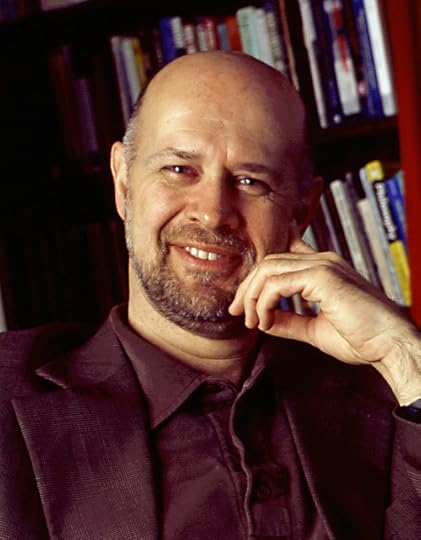
We’re taking advantage of our “Ask a…” series to talk with some of today’s leading theologians about the difficult topic of hell. Earlier this month, Edward Fudge responded to your questions about conditionalism (sometimes called annihilationism)—the view that immortality is conditional upon belief in Jesus Christ, so the unsaved will ultimately be destroyed and cease to exist rather than suffer eternally in hell. Later, Robin Parry responded via video to your questions about Christian universalism—the view that one day God will reconcile all people to himself through Jesus Christ.
As I began exploring options for the view typically referred to as “traditionalism”— that hell is a place of eternal torment—I realized there are a variety of perspectives to consider. For example, a Calvinist will likely view hell much differently than an Arminian….as would someone who identifies as an inclusivist as opposed to an exclusivist. Some, like today’s guest, believe in postmortem repentance, while others do not.
So this may not be the last entry in our hell-themed series! I’d like to also include an exclusivist who believes in predestination, so if I can find a Calvinist who I have not totally alienated and who is willing to participate, I’ll introduce him or her in the weeks to come.
That said, today’s guest is a perfect fit for the series. Jerry L. Walls was born and raised in Knockemstiff, Ohio. He has a PhD in philosophy from Notre Dame, and is the author of over eighty articles and reviews, and a dozen books, including Why I am not a Calvinst (with Joseph Dongell, IVP, 2004) and a trilogy on the afterlife: Hell: The Logic of Damnation (Notre Dame, 1992); Heaven: The Logic of Eternal Joy (Oxford, 2002); and Purgatory: The Logic of Total Transformation (Oxford, 2012). He is also the editor of The Oxford Handbook of Eschatology (Oxford, 2004). His co-authored book (with David Baggett) Good God: The Theistic Foundations of Morality (Oxford, 2011) was named the outstanding book in apologetics and evangelism by Christianity Today in their annual book awards. He has appeared on numerous radio shows including NPR’s “Talk of the Nation” and was interviewed for the documentary “Hellbound?” Before coming to Houston Baptist in 2011, where he is Scholar in Residence, he was a Research Fellow for two years in the Center for Philosophy of Religion at Notre Dame.
Jerry holds a traditional view of hell in the sense that he believes hell is a place of conscious, eternal misery. But he says he agrees with C.S. Lewis’ famous line that "the doors of hell are locked on the inside." So it is the persistent refusal to repent, and accept God's grace and love that keeps hell going, not His determination to keep sinners there against their will. His view is a modification of the traditional view in the sense that he believes God always welcomes sincere repentance, even after death. Unfortunately, he says, some will never exercise that option.
You know the drill. If you have a question about hell for Jerry, leave it in the comment section. Be sure to utilize the "like" feature so we can get a sense of what questions are of most interest to you. After 24-hours, I'll pose seven of the most popular questions to Jerry and post his responses next week.
Ask away!



July 23, 2013
Killing Me Softly: On Privilege and Voice (by Christena Cleveland)

Today I am thrilled to introduce you to
Christena Cleveland, one of my favorite bloggers. Christena is a social psychologist
who's all about helping people use their heads, hearts and hands to do the work
of unity and reconciliation. She is the author of Disunity in Christ:
Uncovering the Hidden Forces that Keep Us Apart (out in November from IVP) and
she blogs at christenacleveland.com. What I
love about Christena’s work is that it is consistently thoughtful, gracious,
and PRACTICAL. Few writers are able to instruct without condescending, question
without growing cynical, and challenge without hurting. I am so grateful for
Christena’s wise perspective and pleased to share a little of it with you today.
###
Killing Me Softly: On Privilege and Voice
By Christena Cleveland
Just last week I spoke at a conference at
which I hardly knew anybody. But about halfway through the week, I made a new
acquaintance and within seconds of swapping similar stories, we became fast
friends. Almost instantaneously, we made a lasting connection – and in that
moment, I felt significantly less lonely. That’s the magic of story-telling.
I love the way that stories powerfully bond
humans together by highlighting common experiences, identity and foes. In fact,
story-telling (or what we social psychologists call personal-disclosure mutual-sharing) is a commonly used
team-building exercise precisely because team identities easily form around the
common experiences that we discover when we share our stories.
As a longtime evangelical, I’ve noticed that
evangelicals are quite good at telling stories – we tell them in our sermons,
our blogs, our books, our songs, our conversations, and even in our most
strident arguments. But I’ve noticed something about evangelical story-telling
that is worth reflecting on: within evangelical America, not all stories are
created equal. Some stories enjoy more prominence than others and story-tellers
from certain groups have dominated the mic for a long time and continue to do
so.
There’s so much talk of a “new evangelicalism”
that is younger, more diverse, less rigid and more open to different viewpoints
than the old evangelicalism. But I can't help but notice that the largest, more
influential platforms within this so-called new evangelicalism typically give
voice to people who have long had a voice. Representatives from the same group
of privileged people who dominated conversations in the 20th century
continue to dominate the conversations about current issues such as modesty
culture, immigration reform, relevancy in culturally-diverse America, gender
issues, and more. Privileged folks – whites, males, the
educated/upwardly-mobile, and others who benefit from living in a society that
accommodates rather than alienates them – continue to stand front and center in
pulpits,
on
blogs
and at
conferences. Meanwhile, the stories and voices of the disenfranchised,
people of color, the informally educated, and the undocumented are woefully
underrepresented. The new evangelicalism looks eerily similarly to the old one.
By
participating in an evangelical world that mirrors the inequitable power
structures of mainstream America, we undermine our Christian witness. More to
the point, the fact that privileged folks continue to enjoy the largest voice
in evangelical Christianity directly contradicts the example of Jesus, who
masterfully used his privileged voice to draw attention to and give voice to
the oppressed voices of his day. Jesus used his platform to create space for the
bleeding woman to share her story, for the
little children to come swap stories with him, and for alienated
ethnic minorities to talk about their experiences and perspectives on faith.
I
suspect that Jesus always knew what social psychologists like me are just now discovering
-- that story-telling helps people connect. People know they matter when
their successes are yours too, their problems are yours too, and their story is
inextricably intertwined with your story. By highlighting the stories of the disenfranchised, he
was inviting his audience to connect with those who live beyond the boundaries
of their privileged spaces. Unfortunately, Jesus’ stewardship of privilege and
voice stands in stark contrast to the patterns of privilege and voice among
evangelicals:
Jesus
used his privilege to extend the
kingdom of God. We, on the other hand, tend to use our privilege to contract the kingdom of God.
Jesus
used story-telling to give voice to the Other and invite the Other in. We tend
to use story-telling to give voice to ourselves and help us identify
like-minded others.
Jesus’
story-telling was other-centered and inclusive. Our story-telling tends to be
me-centered and exclusive.
To
be fair, there are justifiable reasons for this. One, in an effort to consume
information efficiently, our brains seek out self-relevant information. In
other words, our brains are constantly scanning the perceptual world, looking
for information that is relevant to our own stories and perspectives. Since we
have limited cognitive resources, our brains tend to zero in on information
that is self-relevant and ignore information to which we can’t instantly relate.
Due to this natural tendency, we tend to avoid the stories that, at first
glance, don’t seem relatable to us, because listening to those stories would
consume a lot of cognitive energy.
Two,
we share our stories with similar others and gravitate to speakers, writers and
leaders who share stories that resonate with ours because quite frankly, life
is hard and we can use the encouragement. While most (if not all) of us who are
reading this blog are privileged in one way or another, few of us are
privileged in in every social
category. Many of us also identify with at least one oppressed group and know
all too well the pain of being silenced and marginalized by society. We cope by
seeking refuge in the stories that we tell and listen to. It’s comforting to
know that someone understands us, can affirm our perspective and give us a
much-needed pat on the back when we raise our voice. Besides, for those of us
who identify with oppressed groups, it’s important to raise our
historically-silenced voices. Indeed, cultural psychologists agree that in the
West, “the squeaky wheel gets the grease.”
But
when we only pay attention to and promote stories that we personally find
relatable and affirming, we blind ourselves to the ways in which we are cutting
ourselves off from, silencing and marginalizing others. It's easy to think that
only überprivileged people need to think intentionally about connecting with
and creating space for marginalized voices. But those of us who straddle the
line between privilege and oppression need to be equally vigilant in this area.
We can be blinded by our single-minded vision to raise our own voice and in
doing so, ignore and oppress those who have even less of a voice than we do.
In
order to embody Jesus’ intense commitment to give voice to the marginalized, those
of us who are privileged and benefit from having a voice must move from
me-centered story-telling to other-centered story-telling. We must embrace the
kinds of stories that our self-relevance-seeking brains tend to overlook. These
are the stories that, at first glance, seem unrelatable and threaten to consume
our precious cognitive resources. We must also leave our comfortable identity-fortresses
of like-minded others and instead imaginatively inhabit the stories of people
who are nothing like us, befuddle us and even offend us. In doing so, the magic of story-telling will
bind us together, so much so that we take on the perspectives and burdens of
the oppressed, subvert the unjust power structures within evangelical America
and extend the kingdom of God.
So
I propose a new pattern of other-centered story-telling and voracious listening
on the part of privileged people. Let’s create space for and hold our mics up
for the stories and perspectives that have historically been silenced.
Once a
month, my friend Pastor Luke invites a member of an oppressed group to preach
in the pulpit on Sunday morning. I think Pastor Luke is onto something, but you
don’t have to be a pastor to do this. My friend Cate practices simplicity by
giving an article of clothing away whenever she purchases an article of
clothing. I think we can apply this practice to another commodity: time. What
if every time we read an easily
relatable blog post by a more-or-less similar other, we intentionally read a blog post by a marginalized,
dissimilar other? What if every time we shared
an easily relatable blog post by a more-or-less similar other, we intentionally
shared a blog post by a marginalized,
dissimilar other? How might the voices in the evangelical landscape change?
How might we use our privileged voices to
extend the kingdom of God?
###
Read
more from Christena on her blog or follow her on Twitter.



July 22, 2013
What I did on my summer vacation
I went to my favorite place in the world.

(view from the Many Glacier Hotel in Glacier National Park)
I spent some quality time with friends.

(at Logan Pass, Glacier National Park)
I spent some quality time with my best friend.
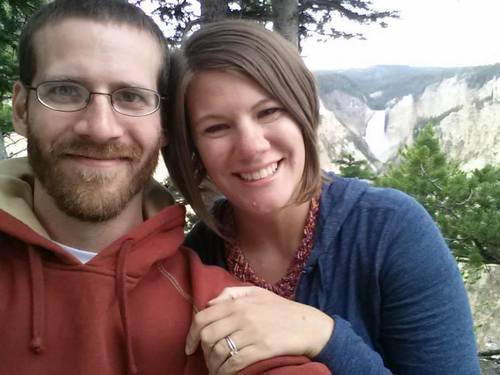
(from Grand Canyon of the Yellowstone, Yellowstone National
Park)
And I spent some quality time with Annie.

I saw things bright and beautiful….

(Swiftcurrent Lake, Glacier National Park)

(Grand Prismatic Spring, Yellowstone National Park)

(The Tetons)

(White Cone Geyser, Yellowstone National Park)
…and c reatures great and small.
(Dan captured this awesome video at Fishercap Lake, Glacier
National Park)

(photo by Dan)

(photo by Dan)

(Photo by Dan)

(Photo by Rachel)
Thankfully, we avoided this potential series of unfortunate
events…


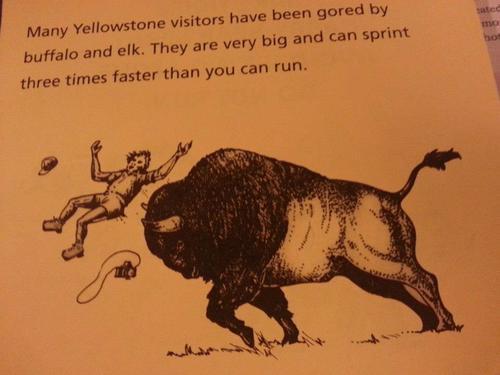
But not this one:

I went to church.
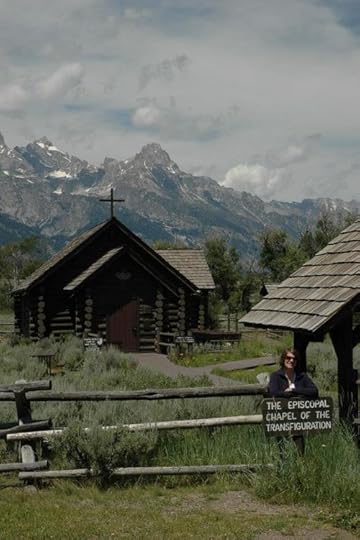
(The Chapel of the Transfiguration, Grand Teton National Park)
I waited for geysers, listened to birds, ran through a
thunderstorm, heard the ground hiss and roar and bubble, smelled sulfur, watched
wildflowers, tracked Moose, dozed off in the sunshine, fiddled with maps, hiked
trails, got off the internet, adjusted to the earth’s schedule for a change, drove to the sun, and
found these words to be true:

(from the Logan Pass visitor’s center, Glacier National Park)
I listened, and in the silence I felt God’s delight in all
these wild things, and I felt God’s delight in me.
I am wiped out, yet refreshed, sore but energized. I’m the best kind of tired there is.
Thanks for giving me the space to rest.



July 9, 2013
Listening…

“Then a great and powerful wind tore the mountains apart and shattered the rocks before the Lord, but the Lord was not in the wind. After the wind there was an earthquake, but the Lord was not in the earthquake. After the earthquake came a fire, but the Lord was not in the fire. And after the fire came a gentle whisper.”
1 Kings 19:11-12
I’m a fan of the internet.
It’s where I connect with you. It’s where I encounter all sorts of new ideas and perspective and interesting people. It’s where I get to practice writing daily. It’s where I first learned of chocolate cake mix waffles.
But I need a break. I need some “wilderness time”—both figuratively and literally—to rest, to quiet myself, and to just listen for a little while.
In our hyper-connected world, its’ easy to forget that listening is the most important part of the writing process and a critical component to faith. With all the chatter, with all the rhetorical earthquakes and windstorms and wildfires that rush in and out of our lives each day, it can be hard to quiet ourselves long enough to recognize the gentle whisper of God.
So that’s what I’m going to do, or at least try to do, for the next couple weeks. I’m signing off the internet—Twitter, Facebook, the blog, Pinterest, (even WebMD unless that rash comes back)—not because the internet is bad, but because it’s a tool that I want to use for good and I can’t do that when I’m burned out.
…Well, I probably could, but after a while y’all would notice.
Right now the plan is to be “back” July 22, at which time we will pick up our interview series on hell with “Ask a traditionalist…”
In the meantime, people often tell me that they read the blog religiously, but haven’t gotten around to reading my books. This is always a little embarrassing for me because I save my best, most personal writing for my books and tend to hammer out most of my blog posts before I’ve even had my second cup of coffee in the morning, which is a hazy, disorienting time in which I am strictly prohibited from making important life decisions or ordering things from the internet. So—shameless plug—if you really want to hear from me over the next few weeks, consider adding Evolving in Monkey Town or A Year of Biblical Womanhood to your summer reading list. Both are almost entirely coherent, which will be a nice change of pace.

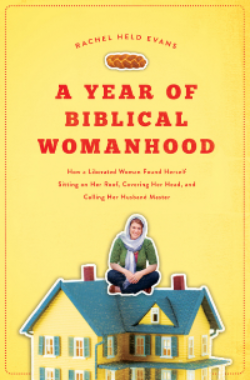
Or, here are some of my favorite posts from the last few years, which are at least 45-60% coherent:
“Enough: Or, why we should all be laughing hysterically in the magazine aisle”
“All right, then, I’ll go to hell”
“The Scandal of the Evangelical Heart”
“How to Watch an Entire Season of The Bachelor and Still Be Too Good For It”
“Confessions of an Accidental Feminist”
“They Were Right (And Wrong) About the Slippery Slope”
“Why I don’t witness to people on airplanes”
Loving the Bible for What It Is, Not What We Want it to Be - Bible Series
“10 Cool Things We’ve Done in 1,000 Posts”
You can also check out our most popular posts (which I recently updated), our “Ask a…” interview series (which includes everything from “Ask a Stay-at-Home-Dad” to “Ask a Pentecostal” to “Ask Jennifer Knapp” to “Ask N.T. Wright”) or our Women of Valor guest post series.
As always, I am grateful beyond words for your readership, insights, and the amazing conversations we have here. Thanks for allowing me to be a small part of your lives.



July 8, 2013
Everyone’s a Biblical Literalist Until You Bring Up Gluttony

…Or divorce, or gossip, or slavery, or head coverings, or
Jesus’ teachings on nonviolence, or the “abomination” of eating shellfish and
the hell-worthy sin of calling other people idiots.
Then we need a little context.
Then we need a little grace.
Then we need a little room to disagree.
I got to thinking about this after I was criticized last
week for my post about loving gay kids unconditionally. Some folks were very
upset that I had the audacity write an entire blog post about putting a stop to
LGBT bullying without including a Bible-based condemnation of LGBT people, or
at least a theological discussion around the issue of homosexuality and
Scripture.
Bible verses were quoted. Open
letters were written. End Times predictions were made. Pillows in
my home were thrown record distances.
It’s funny. Yesterday, in Sunday Superlatives, I included a
quote from Mark Twain in which he referred to a snake oil salesman as an
“idiot,” but no one left an angry comment warning me of hell based on Jesus’
teaching in Matthew 5:22 that “if you call someone an idiot, you are in danger
of being brought before the court; and if you curse someone, you are in danger
of the fires of hell.”
Nor did anyone raise any biblical objections regarding
gluttony a few weeks ago when I casually mentioned overdosing on Sweet Frog
frozen yogurt (strawberry, with a pile of chocolate chips, Oreo crumbs, and
chocolate animal crackers on top, if you must know), or about materialism when I
shared pictures of our new car. (Hey, for some people, a brand new Honda Civic
is pretty flashy.)
And in spite of the flood of emails I get each week condemning
my support of women in ministry, I’ve never received so much as an open letter criticizing
my refusal to wear a head covering, even though my Web site is full of
photographic evidence of what the apostle Paul calls a “disgrace” in 1
Corinthians 11:6.
We may laugh at these examples or dismiss them silly, but
the biblical language employed in these contexts is actually pretty strong: eating
shellfish is an abomination, a bare head is a disgrace, gossips will not
inherit the kingdom of God, careless words are punishable by hell, guys who
leer at women should gouge out their eyes.
Heck, you could make a pretty good biblical case for
gluttony being a “lifestyle sin” that has been normalized by our culture of "Supersized" portions and overflowing buffet lines, starting
with passages like Philippians 3:19 (“their god is their belly”), Psalm 78: 18
(“they tested God in their heart by demanding the food they
craved”), Proverbs 23:20 (“be not among drunkards or among gluttonous
eaters of meat”), Proverbs 23:2 (“put a knife to your throat if you are given to
appetite”), or better yet, Ezekiel 16:49 ("Now this was the sin of your sister Sodom: She and her daughters were arrogant, overfed and unconcerned; they did not help the poor and needy.")
Yet you don’t see weigh-ins preceding baptisms or people
holding “God Hates Gluttons” signs outside the den of iniquity that is Ryan’s
Steakhouse.
And we haven’t even touched on materialism, or the fact that on the day I stuffed my face with froyo, 30,000 kids died from preventable diseases and many more went hungry.
It seems the more ubiquitous the biblical violation, the
more invisible it becomes.
So why do so many Christians focus on the so-called “clobber
verses” related to homosexuality while ignoring “clobber verses” related to
gluttony or greed, head coverings or divorce?
Why is homosexuality the great biblical debate of this decade and not
slavery, (as it once was) or the increasing problem of materialism and inequity?
Why do so many advocate making gay marriage illegal but not divorce, when Jesus
never referenced the former but spoke quite negatively about the latter?
While there are certainly important hermeneutical and
cultural issues at play, I can’t help but wonder if something more nefarious is
also at work. I can’t help but wonder if
biblical condemnation is often a numbers game.
Though it affects more of us than we tend to realize, statistically,
homosexuality affects far fewer of us than gluttony, materialism, or divorce.
And as Jesus pointed out so often in his ministry, we like to focus on the
biblical violations (real or perceived) of the minority rather than our own.
In short, we like to gang up. We like to fashion weapons out of the verses
that affect us the least and then “clobber” the minority with them. Or better
yet, conjure up some saccharine language about speaking the truth in love
before breaking out our spec-removing tweezers to help get our minds off of
these uncomfortable logs in our own eyes.
We see this in the story of the religious leaders who ganged
up on the woman caught in adultery. She was such an easy target: a woman,
probably poor, disempowered, and charged with the go-to favorite of the
self-righteous—sexual sin. When they brought her to Jesus, they were
using her as an example to test him, to see how “biblical” his response to her
would be. (See Deuteronomy 22:23-14.)
Jesus knelt down and scribbled in the sand before saying, “He who is
without sin can cast the first stone.” They dropped their stones.
While self-righteousness avoidance certainly affects our
selective literalism , we also have good reasons for not condemning one another
for the more ubiquitous biblical violations (again, real or perceived) in our
culture.
It’s hard for me to flatly condemn divorce, for example,
when I know of several women whose lives, and the lives of their children, may
have been saved by it, or when I hear from people who tell me they would have
rather come from a broken home than grown up in one. We have a natural revulsion
to the idea of checking people’s BMI before accepting them into the Church,
especially when obesity is not necessarily reflective of gluttony (often, in
this country, it is a result of poverty), and when we know from our own
experiences or the experiences of those we love that an unhealthy weight can result
from a variety of factors—from genetics to psychological components—and when some
of our favorite people in the world (or when we ourselves) wrestle with a
complicated relationship with food, whether it’s through overeating or under-eating.
Again, it’s a numbers game. It’s hard to “other” the people
we know and love the most. It’s become a cliché, but everything changes when
it’s your brother or sister who gets divorced, when it’s your son or daughter
who is gay, when it’s your best friend who struggles with addiction, when it’s
your husband or wife asking some good questions about Christianity you never
thought about before. Our relationships
have a tendency to destroy our categories, to melt black and white into gray,
and I don’t think God is disappointed or threatened by this. I think God
expects it. It happened to Peter when he encountered Corneilus and Philip when
he encountered the Ehtiopian eunuch. Suddenly it became a lot harder to label your friends "unclean" or "unworthy."
After all, when God became flesh and
lived among us, the religious accused him of hanging out with “sinners" (even gluttons!) never
realizing that this was the whole point, that there were only “sinners” to hang
out with.
Of course, all of this raises questions about when it’s
right or wrong to “call out” sin, and I confess I’m no good at sorting that
out. I’m as hypocritical as the next person, judgmental of those I deem judgmental,
self-righteous, indulgent, a gossip, too careless with my words, too quick to
get angry at certain people with certain theological views, too easily seduced
by money and notoriety and…my favorite things in the whole entire world…AWARDSI
LISTS! ACCOLADES!
I too need reminding that, for all my big talk about a
“Christocentric hermeneutic,” more often than not, I’m following a
“Rachelcentric hermeneutic” when I read the Bible, complete with my own biases, preferences,
insecurities, and opinions guiding how I “pick and choose.” (Oh I can wield
every Bible verse that challenges Calvinism like a knife, but I’d rather not
talk about how I’m actually applying the Sermon on the Mount to my life or what I really think about enemy-love.)
Should we stop discussing which biblical instructions apply
today and how we ought to apply them? Certainly not. Should we remain silent
when the vulnerable are oppressed and exploited or when injustice and
immorality pervades our culture? No. Do we abandon our convictions about what
the Bible says is sin? No, not even when we disagree on that. Are rhetorical questions
overused in blog posts? Yes.
But it’s good to remind ourselves now and then that just as
Southern slaveholders had a vested interest in interpreting Colossians 3:22
literally, so we tend to “pick and choose” to our own advantage.
And when we make separate categories for the “real sinners,” when we reduce our
fellow human beings to theological issues up for constant debate who cannot even be told they are loved without qualifiers, when our
hermeneutic conveniently renders others the problem and us the heroes, maybe
it’s time to sit across a table and get to know one another a little better, to
break up some categories and make some new friends. Maybe it’s time to drop our
stones for a while and pass the bread.
…healthy, whole grain, organic bread, of course.



July 7, 2013
Sunday Superlatives 7/7/2013
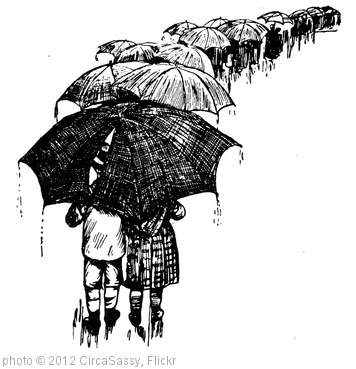
IRL…
It has been raining for five days straight here in East Tennessee, resulting in terrible flooding and a very disappointing 4th of July. This afternoon I caught a brief glimpse of what I believe was the sun….but I can’t be sure. Please keep those whose lives have been affected by the flooding in your thoughts and prayers.
On to Superlatives….Best Headline:
“Angry Mother of Twins Throws Flaming Diapers at Late-Night Firework Shooters”
Best Review:
Genevieve Koski with “10 episodes that made King Of The Hill one of the most human cartoons ever”
“But while King Of The Hill’s reputation as a steadfast, down-to-earth series rightly reflects the heart and humanity at the show’s center, it belies how uproariously funny the series can be, often because of that very humanity. It’s the exact intersection of the comic sensibilities of its two creators: Mike Judge’s ability to find the bizarrely hilarious in the mundane (as seen in Beavis And Butt-head, Office Space, and many others) meets Greg Daniels’ character- and relationship-based humor (as seen in The Office and such Daniels-penned Simpsons episodes as “Lisa’s Wedding,” “Bart Sells His Soul,” and “Secrets Of A Successful Marriage”). King Of The Hill’s characters aren’t funny because they tell perfectly crafted jokes or make pop-culture references or constantly get themselves into ridiculous situations; they’re funny because they have real hopes, flaws, and limitations that satirize the absurdity of everyday life while simultaneously celebrating it.”
[Dan and I love “King of the Hill.” My favorite episode is when the Hill’s visit a megachurch.]
Best Observation (found via Wesley Hill):
Alan Jacobs with “On Intellectual Triage and Not Writing People Off”
“Again, we all do this, but we are often reluctant to admit it because we want to present to the world a façade of rationality: I hold my views firmly because I have carefully examined the alternatives and have justifiably rejected them. And sometimes we have indeed carefully examined the alternatives; but usually we haven’t. We’ve undertaken intellectual triage and set a great many possibilities aside with limited or no scrutiny. This is what Dawkins has done with Christianity; he just thinks he hasn’t.”
Best Analysis:
Rachel Marie Stone with “What if Jesus is saying it's okay to pay for things that are against your religion? (Since you probably always are)”
“"Where I pause is when 'religious liberty' gets defined as 'I shouldn’t have to pay for something I disagree with.' The contraceptive mandate may feel or seem more 'direct' than the taxes that pay for the boxes of Depo-Provera in Malawi and elsewhere, but it amounts to much the same thing: a government-mandated outlaying of money in accordance with certain laws. A tax. 'Render unto Caesar' applies here. Whose image is on that dollar bill? Uncle Sam’s. So give unto Uncle Sam what belongs to Uncle Sam. And, yes, whether at home or abroad, Uncle Sam will probably use your dollar bills to pay for things that contradict something your religion teaches. My understanding of my religion includes the importance of caring for the earth and not taking human life, but my taxes subsidize oil companies, fund unjust wars, and pay for the injections used in the execution of people on death row. I despise that…”
[Rachel hits on every point I make when discussing this issue. It baffles me that my fellow evangelicals are so adamantly opposed to something that could dramatically reduce abortions.]
Best Interview:
Pete Enns interviews Timothy Michael Law, author of “When God Spoke Greek”
“One thing we do not need to wait any longer to say is this: the existence of multiple forms of scripture (Greek and Hebrew) in antiquity, both before, during, and after the time of Christ, did not bother early Christians. The search for an “original text” on which to ground one’s faith is a distinctively modern worry. Even when Christians began recognizing divergences between the Jewish Scriptures and their own, many saw it as an opportunity to discover more than one way to understand divine communication.”
Best Conversation-Starter:
Scot McKnight with “Who Says What’s an Egalitarian”
“Those egalitarian-complementarians saw marriages and men and women relations as complementary and equal and not hierarchical. So the early egalitarians among evangelicals saw themselves as complementarians and then the complementarians grabbed the term, and frankly it sounds better than hierarchicalists. But the fact is that the word complementarian today means hierarchalist while the term egalitarian can mean totally equal or mutualist. I really like the term mutualist. I remember studying this issue and it dawning on me that I was an old-fashioned complementarian, which meant different, equal and complementary, but not roles or hierarchy, and I felt flummoxed by the whole discussion. Then a friend pointed out to me that the egalitarians originally wrote a book called ‘complentarity without hierarchy’ so I suppose you could say we have two kinds of complementarians: those without hierarchy and those with it.”
Best New Tumblr Page:
“Hogwarts Seminary”
Best Perspective:
Ann Voskamp’s reflections after visiting Katie Davis
“But our answers to all the raging questions of the day won’t be found in what we write: it will be found in how we open our doors. Our actual theology is best expressed in our actual hospitality. And I don’t mean that hospitality is one quaint ministry for those good in the kitchen and keeping their house picked up. Hospitality isn’t for the good housekeepers — it’s the grid of life for anyone keeping company with Christ. Hospitality is meant to shape our churches and politics, our work and our schools, our homes and our faith and our schedules and our meals and our lives. Hospitality is Life with no Gates. Hospitality means if there is room in the heart — there is always room in the house."
Best “Open Letter” of All Time:
Mark Twain drafts the ultimate letter of complaint (to a snake oil salesman)
“The person who wrote the advertisements is without doubt the most ignorant person now alive on the planet; also without doubt he is an idiot, an idiot of the 33rd degree, and scion of an ancestral procession of idiots stretching back to the Missing Link.”
Best Writing (nominated by Brad Jenson):
Anne Helen Peterson with “There are things of which I may not speak”
“In short: my ex-boyfriend was killed in the war. I don’t know how else to put it, and I’ve tried different ways of phrasing it to make it sound less blunt, but it’s difficult. He was my first love and first true despair, he was the best person I knew and, for very a brief period of time, the worst. I toyed with his heart; I drove him crazy. He was the most significant figure in my life, the most pivotal. He was handsome, Tom Cruise-short, and always tan. In high school, he won Best Smile, but it was never a contest. His football coach talked about him with superlatives usually reserved for the pros. He was lazy and devastatingly smart; he loved Coke and plain white t-shirts. He was the first boy to see something electric in me, an electricity he desired.”
Best Idea (nominated by Nish Weiseth):
Austin Green at the Salt Lake Tribune with “Fresh Produce, Fresh Start for Salt Lake County Inmates”
“When Kevin Long and George Raska talk about their daily routine, they interrupt each other with excitement. They mention the sunshine, the healthy food, the educational opportunities, the trust — not exactly what you’d expect to hear from a couple of inmates at a county jail…”
Best New Site (nominated by Scott Lencke)
“Respectful Conversations”
Best List:
Sam Killermann with “30 + Examples of Christian Privilege”
[I wouldn’t agree with all of these, but many are certainly worth keeping in mind.]
Best Photo Series (nominated by Micah Odor):
“Book Titles With One Letter Missing”
Best Response:
Katelyn Beaty with “My Calling as a Female Breadwinner”
“So Strachan, Kassian, and other Christians who say that men must work outside the home while women must work inside it demonstrate a classic case of anachronism—and a troubling case of broken anthropology. Because when it comes to questions of what God designed us humans to do, some complementarians put women into a mold they were never obligated to fill….Whatever you do, lady reader—and however much or little money you make doing it—do it with all your heart, knowing that you receive your calling and identity from God, not from fellow Christians who play exegetical leapfrog with Scripture.”
Wisest:
Abby Norman with “A Mom with a Dream”
“But there is one thing they will tell you that I am sure is wrong. There is one piece of advice that I will hand out freely and earnestly to anyone who will let me put it into their hands. Bring your whole self to motherhood, even the creative pieces, even the messy parts covered in paint and ink, soaked in un-attained dreams. Your baby needs their momma to dream.”
Bravest:
Elora Nicole with “For When the Silence Comes”
“And if I do speak, I still want it to be holy and broken. I want to find this pain and minster out of it because it’s through His own broken body we find our healing. I pray that in moments of human frailty, I’ll remember Who sits with us in the silence, when words fail and our hearts are breaking in a million pieces. I may not have all the answers. But I know He can take our weakness.”
Cutest:
“18 Babies Experiencing Things for the First Time”
Coolest:
“Artist shows what Barbie would look like as an average woman”
Related, and Funny (shared by Christina Entz Moss)
The Onion with “Bratz Dolls May Give Girls Unrealistic Expectations”
Most Heartbreaking:
Linda Robertson with “Just Because He Breathes: Learning to Truly Love Our Gay Son”
“We said all the things that we thought loving Christian parents who believed the Bible, the Word of God, should say…”
Most Practical:
Shauna Niequist with “3 Lessons I’ve Learned About Creating, Consuming, and Criticism”
“My work is up for public comment. But my work is not who I am. And who I am is not up for public comment.”
Most Empowering:
Kathy Escobar with “Stand Back Up”
“…There is a battle that is beyond flesh and blood to keep women around the world on their knees.”
Most Frustrating:
Ben at Remythologized with “A Seminary Student Visits the Creation Museum: 27 Million Dollars of Bad Exegesis”
“Walking through the museum, I was appalled by the colossal fortune expended on ideas that are obviously deficient in an education in Ancient Near Eastern history and modern Biblical studies…”
Most Enlightening:
Heather Kopp with “Why Christians Make Miserable Addicts”
“Convinced that alcoholism was a sin issue only, it never occurred to me that my response to alcohol -- I got thirstier the more I drank -- could be abnormal or indicate a physiological condition. And I'm not alone. Thousands, if not millions, of us Christians have made the same mistake and been caught in the vicious cycle of addiction. Embarrassed by our lack of self-discipline, we pull up our spiritual bootstraps and try harder. We pray and repent until we're blue in the face. When our efforts continue to fail us, we feel ever more guilty and ashamed.”
Most Relatable:
Richard Beck with “Mattering”
“And I do the same thing. I'll check my blog statistics. How many hits? Subscribers? Comments? Links? Tweets? I'll check Amazon. Book sales? Reviews? I want to matter. Behind it all is a deep-seated insecurity, a dread that if we aren't noticed that we aren't worth anything. And if that's the case, let's revisit Jesus' commands and example from above. How can we become insignificant and small--how can we rest into being unnoticed--given our massive insecurities? Because I don't think we fail to follow Jesus because we are wicked and depraved. I think we fail to follow Jesus because we want to matter.”
Most Personal:
Lauren Rea Preston with “How I Learned Compassion”
“And dear God, I have so much compassion now. For every person who has been labeled a heretic. For every person who was told "don't ask too many questions, that's a slippery slope." For every mom or dad that has people whispering behind their back about their parenting or life choices. For every person who the church has shunned, overtly or covertly. For every person who feels like no one "gets them" and everyone is judging them (because maybe they are). Single people. Single moms. Couples without children. Gay people. Black people. Democrats. And I'm so sorry. To every person I have ever judged with my words or my thoughts. For every time I have argued instead of listening. For every time I have participated in the behind-the-back whispering. To every person I shunned because I was too scared of people's opinions. My message to others, but mostly to myself is this--it's okay to be different. It's okay to have different opinions about life, God, the Bible, parenting, etc. It's okay to have disagreements, to make mistakes, and change your mind. It's okay to say, "I don't know." And above all, it's okay to really not know. Because we really don't. We just don't really know anything.”
Most Eye-Opening (nominated by Caris Adel):
Ryan Thomas Neace with “The American Dream for Losers”
“This is not to preclude the possibility that Jesus might deliver Rashid and David, but this is by far the exception if it means extrication from their circumstances. Jesus usually seems more interested in delivering people within their circumstances than from them.”On the blog…
Most Popular Post:
“If my son or daughter were gay…”
Most Popular Comment:
In response to that post, Tyrell wrote:
"You wrote: ‘If God blesses Dan and I with a child who is gay, I would want that child to know without a doubt that he or she is loved unconditionally.’ Thank you for using the word ‘bless.’ You don't know how much love that one statement conveys. I'm a young man struggling with my sexual orientation and so often it feels like a horrible, painful curse. Thank you.”
[The entire comment section is worth a read as we heard from hundreds of LGBT folks and their parents, who shared both painful and hopeful stories.]
###
So, what caught your eye online this week? What’s happening on your blog?



July 5, 2013
Ask a Universalist…(Response)
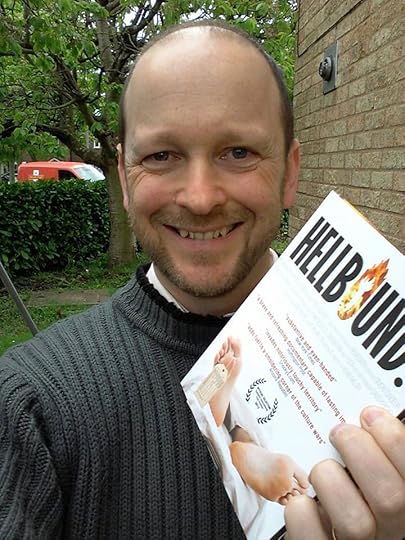
We’re taking advantage of our “Ask a…” series to talk with some of today’s leading theologians about the difficult topic of hell. Earlier this week, Edward Fudge responded to your questions about conditionalism (sometimes called annihilationism)—the view that immortality is conditional upon belief in Jesus Christ, so the unsaved will ultimately be destroyed and cease to exist rather than suffer eternally in hell. Today, Robin Parry responds to your questions from yesterday about Christian universalism, the view that one day God will reconcile all people to himself through Jesus Christ. (Talk about instant gratification!) And he did so with a series of videos.
Robin is a theological editor for Wipf and Stock Publishers. He lives in the UK and is the husband of but one wife and the father of two beautiful daughters (and the proud owner of a three-legged cat). Robin has written books on topics like Old Testament ethics, the book of Lamentations, and trinitarian worship. He is the author of The Evangelical Universalist, a controversial text written under the pen name of Gregory MacDonald. His impossible dream is to play the harmonica as well as Sunny Boy Williamson.
Robin was recently featured in the feature-length documentary, Hellbound, (which would be a great film to watch along with our series!) He's got a great sense of humor and has an engaging, conversational approach to discussing matters of theology.
I hope you learn as much from Robin’s video responses as I did. (For those who would prefer a transcription, I’m afraid I will not have time to do it myself. But if someone wants to volunteer to transcribe, I’d be happy to include it.)
UPDATE: Jessica had kindly transcribed the responses in the comment section below. I'll link to her transcription after each video. Thanks, Jessica!!
Robin begins with an introduction and then tackles your top seven questions:
Read the transcript of the introduction
From Philip: Universalism is a broad term and seems to live both within and outside Christian categories. What in your opinion distinguishes a person as a "Christian" universalist from another forms of universalism?
From Arni: Robin, what do you consider the strongest argument against universalism - and how do you answer it?
From Rick: Robin, thanks so much for taking our questions. I've found myself leaning toward the Universalism camp more and more, but sometimes I feel paralyzed by the fear of the consequences if I'm wrong. Not that I'm afraid I'll go to Hell, but I'm afraid what it would mean to learn that I should have been working harder to keep my family and friends out of Hell (which is the fear often put on people to go out and evangelize, even in embarrassing and disrespectful ways). I was wondering if you have any advice for putting this fear to rest? Also, how do Universalists view evangelism, and what should evangelism entail right now, considering the world's total future reconciliation with God?
From Amy: Hi Robin! Let me start of by saying that I've read your book, and found it extremely helpful and well argued. I have considered myself a universalist for a little over a year, and your book masterfully articulated many of the ideas I had been working through in that time. That said, the question I get asked most as a universalist (and one that you did address in your book to some extent) is this: if everyone will ultimately be saved, why bother being a Christian? I'm not even entirely sure how to process this question, because my first inclination is to respond that, if the removal of the threat of hell eliminates all motivation for following Jesus, then we have a serious problem. At the same time, though, I don't really have an answer for folks who say, "Well then why not just be a good person, even try to live like Jesus, but not bother with Christianity?" Quite frankly, as an LGBT person in the church, I'm beginning to see the appeal of this approach. Why not just be a Jesus follower, and leave all the craziness in the church behind? I'm not sure this is exactly a question, but any thoughts on this would be great.
From Dan: How do you reconcile your beliefs that all will eventually be saved with the scriptures that seem to indicate that not all will accept salvation, specifically those in Revelation 20:14-15 (those whose names are not in book of life and go to lake of fire/second death) and Matt. 7:13-14 (“broad is path to destruction…many take it; narrow is way to life, few find it”)? Thanks!
From Michelle: I was already asking questions about Hell and who goes there when I watched the movie Hellbound. Even so, I experienced such a paradigm shift that when people asked me about the movie I couldn't even put it into words for a few day. It was very well done. My question is, "What do you say to a person who has experienced horrible evil from the hands of another person (such as: abuse, rape, war, etc.) when they find out you believe that his/her tormentor will be reconciled to God and not suffer eternal punishment?"
From Justin: How do you respond to the historical tradition of condemning Universalism and/or how do you respond to the criticism that you are innovating beyond what the Bible "clearly" says?
Thanks again for your questions! You can check out every installment of our interview series—which includes “Ask an atheist,” “Ask a nun,” “Ask a pacifist,” “Ask a Calvinist,” “Ask a Muslim,” “Ask a gay Christian,” “Ask a Pentecostal” “Ask an environmentalist,” “Ask a funeral director,” "Ask a Liberation Theologian," "Ask Shane Claiborne," "Ask Jennifer Knapp," and many more— here.



July 3, 2013
Ask a Universalist….
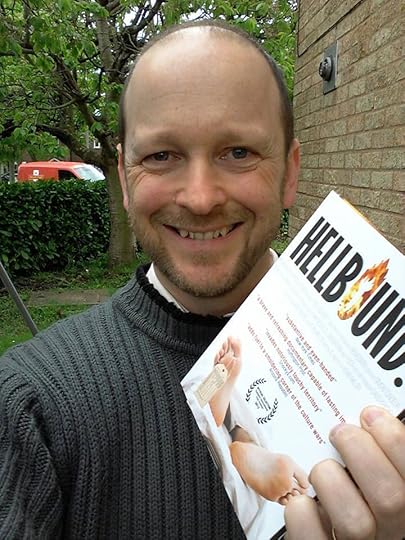
We’re taking advantage of our “Ask a…” series to talk with some of today’s leading theologians about the difficult topic of hell. Yesterday, Edward Fudge responded to your questions about conditionalism (sometimes called annihilationism)—the view that immortality is conditional upon belief in Jesus Christ, so the unsaved will ultimately be destroyed and cease to exist rather than suffer eternally in hell.
Today, I’d like to introduce Robin Parry, who describes himself as an evangelical universalist. Robin holds the view that one day God will reconcile all people to himself through Jesus Christ.
Robin is a theological editor for Wipf and Stock Publishers. He lives in the UK and is the husband of but one wife and the father of two beautiful daughters (and the proud owner of a three-legged cat). Robin has written books on topics like Old Testament ethics, the book of Lamentations, and trinitarian worship. He is the author of The Evangelical Universalist, a controversial text written under the pen name of Gregory MacDonald. His impossible dream is to play the harmonica as well as Sunny Boy Williamson.
Robin was recently featured in the feature-length documentary, Hellbound, (which would be a great film to watch along with our series!) He's got a great sense of humor and has an engaging, conversational approach to discussing matters of theology.
You know the drill! If you have a question about universalism for Robin, leave it in the comment section. Be sure to utilize the "like" feature so we can get a sense of what questions are of most interest to you. After 24-hours, I'll pose seven of the most popular questions to Robin and post his responses next week.
Ask away!



Rachel Held Evans's Blog
- Rachel Held Evans's profile
- 1710 followers



